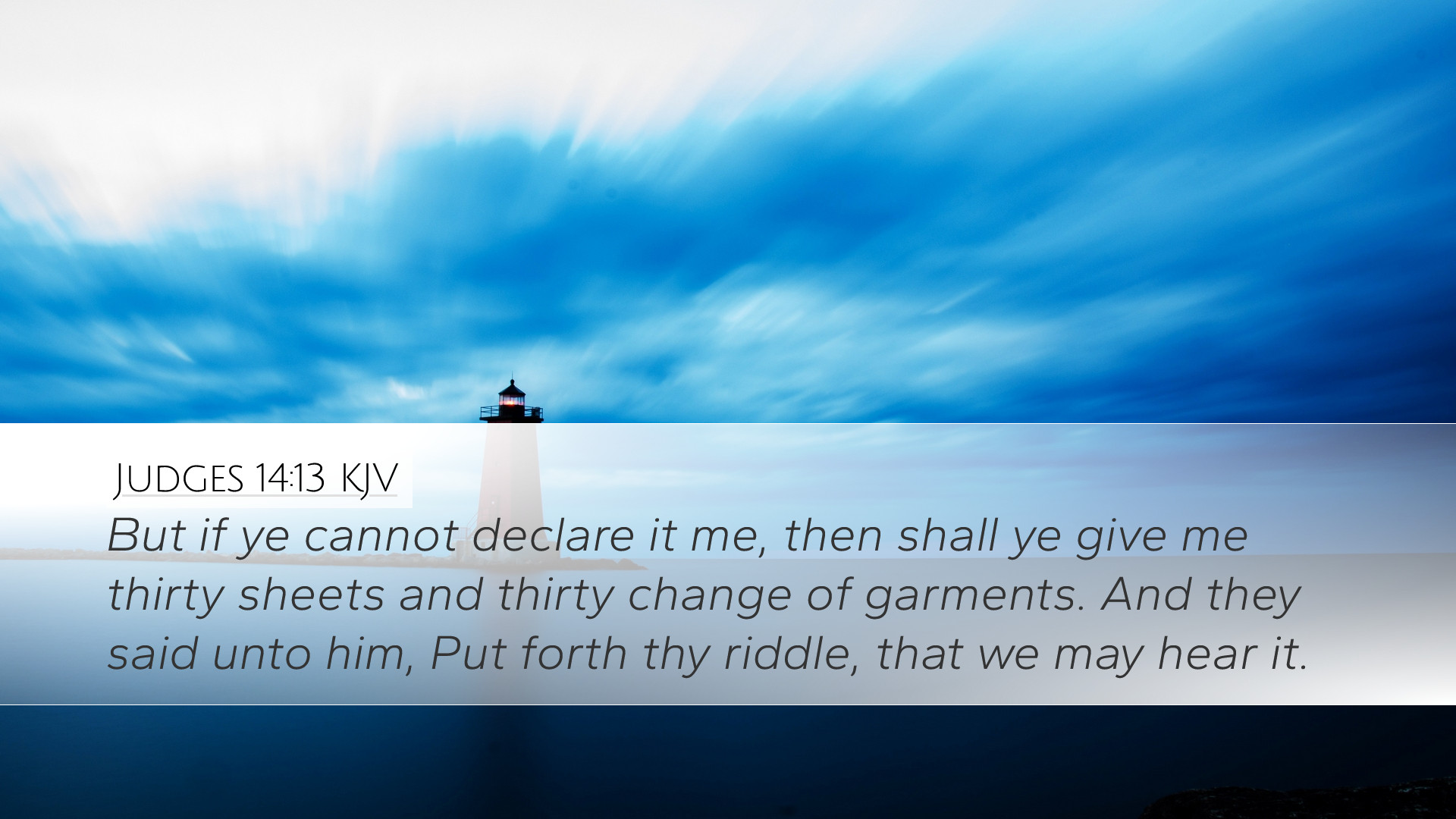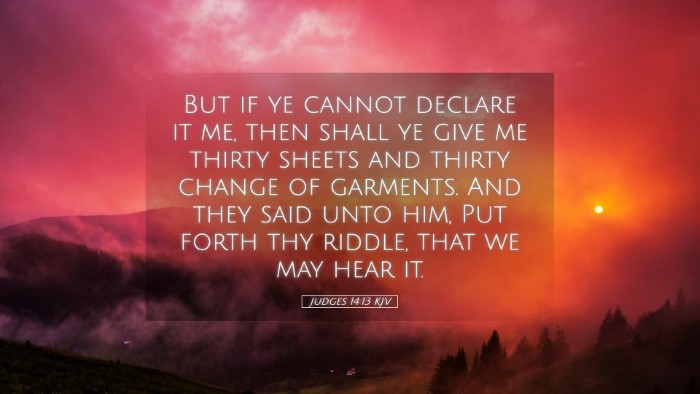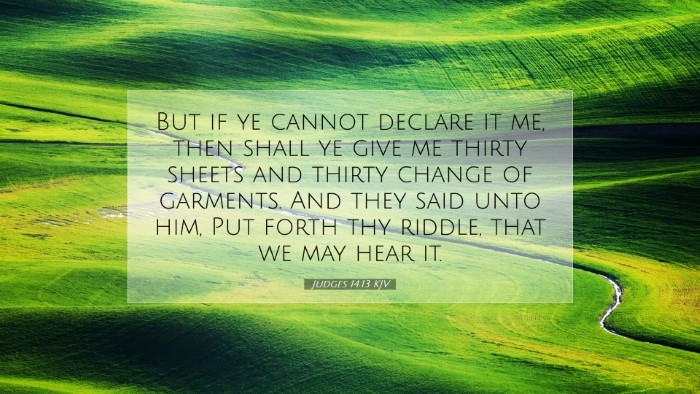Old Testament
Genesis Exodus Leviticus Numbers Deuteronomy Joshua Judges Ruth 1 Samuel 2 Samuel 1 Kings 2 Kings 1 Chronicles 2 Chronicles Ezra Nehemiah Esther Job Psalms Proverbs Ecclesiastes Song of Solomon Isaiah Jeremiah Lamentations Ezekiel Daniel Hosea Joel Amos Obadiah Jonah Micah Nahum Habakkuk Zephaniah Haggai Zechariah MalachiJudges 14:13
Judges 14:13 KJV
But if ye cannot declare it me, then shall ye give me thirty sheets and thirty change of garments. And they said unto him, Put forth thy riddle, that we may hear it.
Judges 14:13 Bible Commentary
Bible Commentary on Judges 14:13
Text of Judges 14:13: "But if you cannot explain it to me, then you must give me twenty-five linen garments and twenty-five changes of clothing." (ENG) - This verse captures a critical moment in the narrative of Samson as it relates to his riddle and the wagers he places upon it.
Introduction
This commentary seeks to explore the implications of Judges 14:13 through the lenses of notable public domain commentaries, particularly the insights of Matthew Henry, Albert Barnes, and Adam Clarke. The verse serves as a focal point not only for understanding the character of Samson but also for discerning broader themes of human behavior, divine sovereignty, and the narrative trajectory of Israel's judges.
Contextual Background
The verse is located within the larger context of Samson's narrative, which spans Judges 13-16. Samson's birth is foretold (Judges 13) as a sign of God’s mercy and intervention in Israel’s plight under Philistine oppression. The riddle posed by Samson to his wedding party subsequent to the events in Judges 14:12 showcases themes of pride, intellect, and the elements of challenge.
Understanding the Riddle
Samson's riddle demands insight into the paradox of death producing life, a metaphor reflecting the complexity of his own mission in Israel and foreshadowing later events in his life. The inquiries that arise from the riddle exhibit the human tendency to contest and confront in matters where wisdom and insight are sought.
Commentary Highlights
Matthew Henry’s Insights
Matthew Henry emphasizes the importance of understanding the nature of the riddle itself. He posits that it symbolizes the profound truth that life often emerges from death. He notes that the riddle serves as a reflection of God's methods of delivering His people, often using subsequent events that appear paradoxical to achieve His purposes.
Albert Barnes’ Perspective
Albert Barnes highlights the cultural significance of wager-making in ancient Hebrew society. The stakes of twenty-five linen garments and changes of clothing emphasize not merely the material aspect but also the social dynamics at play during this wedding feast. Barnes reflects on how these wagers lay bare the interpersonal tensions and the folly of pride, characteristic of the Philistine wedding guests who are compelled to seek answers through cunning rather than wisdom.
Adam Clarke’s Analysis
Adam Clarke takes a detailed look at the phraseology in Judges 14:13. He notes the immediacy of Samson's demand and suggests that the wager reflects the growing animosity and tension between him and the Philistines. Clarke posits that this moment encapsulates a pivotal shift in Samson's life, marking the beginning of significant strife between Israel's judge and Israel's oppressors.
Thematic Implications
- Divine Sovereignty: Each commentary underlines the control God maintains over the unfolding narrative of Israel’s judges and highlights how even through flawed human choices, divine plans are executed.
- Pride and Folly: The wager demonstrates how pride blinds individuals to their limitations. The Philistines' need to solve the riddle through deceit mirrors humanity's recurrent struggle with pride.
- Human Relationships: The familial and communal bonds are tested through Samson's challenge, showcasing how interpersonal relationships can be eroded by competition and strife.
Conclusion
Judges 14:13 invites deep reflection on the meaning of human endeavors in relation to God’s plans. The insights from Henry, Barnes, and Clarke collectively contribute to a richer understanding of how riddle, wager, and pride intersect in the tapestry of biblical narrative. For pastors, students, and scholars alike, this verse serves as a reminder of the significance of pursuing wisdom and understanding amidst human folly.
As reflected in the commentaries, the path of wisdom often traverses complex terrain, and the lessons drawn from Samson’s narrative encourage the faithful to seek God’s truth rather than rely solely on human intellect.


